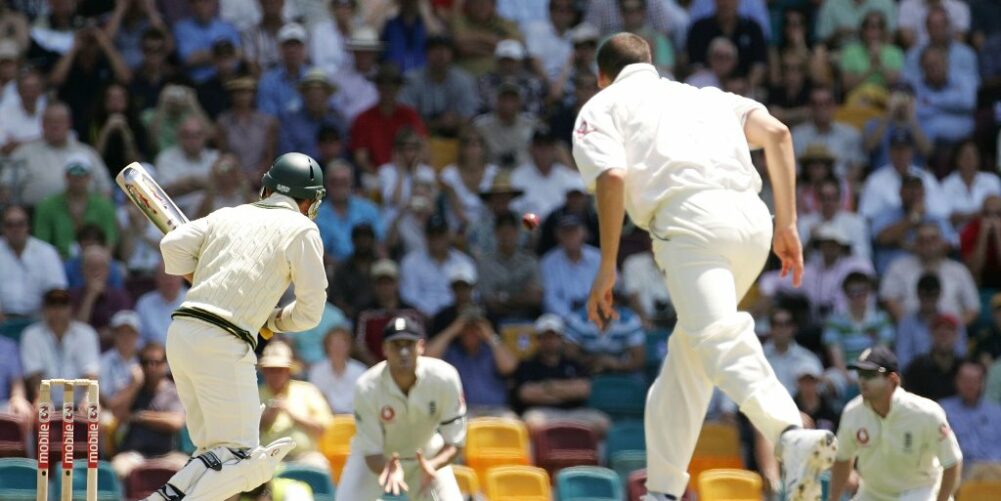By Richard Edwards
If the summer of 2005 washed away years of Ashes hurt, then the winter of 2006/07 brought some painful memories flooding back. Not since 1920/21 had an England side travelled to Australia and returned home having been trounced 5-0 in a Test series Down Under.
Even in the dark days of the Nineties, England had always managed to stave off a whitewash by drawing, and sometimes even winning, the odd game in Australia.
So surely, after beating the Australians in thrilling fashion at home the previous summer, England supporters could expect more of the same.
The bookies didn’t agree, making the Aussies 3-1 on favourites to recover the urn after having it ripped from their grasp by Michael Vaughan’s side in a first series defeat in England since 1985.
England, under the guidance of talisman Andrew Flintoff, in contrast, were lengthy outsiders at 11-2.
Still, the bookies don’t always get it right do they?
If England’s run-up to the 2005 Ashes had been textbook, then the preamble to the sequel could not have gone any worse. The first blow was delivered just months after England’s open-top tour to celebrate one of English sport’s seminal moments, with Troy Cooley deciding to hop off the bus and head back to Australia.
Delays in negotiating a new contract for the Tasmanian meant that Australia were already sniffing around his bins by the time the rubbish was being cleared from the Oval following the drawn Test that sealed the deal for England.
“By the time I got around to negotiating with them (the ECB) again, towards the end of the Ashes, other people were talking to me,” he told The Guardian in an interview shortly before Christmas 2005.
His loss was a huge blow and one that England and, arguably, then-coach Duncan Fletcher, never recovered from.
Further concerns surfaced at the ICC Champions Trophy in India just a month before hostilities recommenced in Brisbane – and the major worry for England was the wayward form of their most potent bowler, Steve Harmison.
The Durham man was smashed for 45 off just 4.5 overs as England were thrashed by Australia in Jaipur in a disastrous campaign that saw Fletcher’s men tumble out of the tournament at the group stage.
The technical flaws that appeared to have been ironed out by Cooley were re-surfacing.
“We have to make sure he is ready and firing for Brisbane,” said Fletcher. “He has to realise that he must work harder and harder and not take his game for granted. It is the mental thing which creates the technical problem.”
That hardly made it the most simple issue to solve for an England coaching set-up thrown into disarray by Cooley’s departure.
Just 14 months on from bringing the Ashes home, the calls for Fletcher to step down from his role were getting louder by the day, much to the merriment of an Australian side who had copped more than their fair share of flack the previous summer.
One of England’s key men in the series would be Marcus Trescothick, who had flown home from the tour of India earlier that year.
At England’s pre-tour media free-for-all in Sydney, the Somerset man was besieged by journalists wanting to know what frame of mind he was in in the run-up to the first Test.
“…I have made big strides towards being how I was (before the illness),” he said. “I have had a nice break, had a family holiday and put it all behind me and I am raring to go.”
They were positive words but, just nine days before the first Test, Trescothick would be flying home with a recurrence of the stress-related illness that had forced him out of the tour to India just months earlier. With Michael Vaughan already missing, Trescothick’s departure was a hammer blow and further served to spread doubt in the dressing room.
“We weren’t the side we were in 2005 and the Aussies were ready for us,” says left-arm spinner Ashley Giles, who was chosen in favour of Monty Panesar for the opening match of a series that had sold out in days.
“They were keen for revenge, that much was obvious as soon as we touched down.”
In reality, England’s faint hopes of retaining the Ashes relied on Kevin Pietersen and Flintoff repeating their heroics of the previous summer.
Harmison would also need to play a full role if that historic victory was to be repeated.
It was the Durham man who was charged with bowling the first ball of the series in front of a full house at the Gabba.
And we all know what happened next.
“I was standing at mid-off when Steve delivered the ball straight into Freddie’s hands in the slips,” says Giles. “I went up to Harmy and said, ‘I know you and Freddie are good mates, but you didn’t have to bowl it directly to him’. I was trying to lighten the mood.”
By the time the first three overs had been completed, Australia were flying and Harmison had been removed from the attack.
Jimmy Anderson then stepped into the breach and was promptly dispatched for 10 in his first over in an England shirt for seven months.
Whatever plans Flintoff may have had up his sleeve had gone out of the window.
“This is no slight on Freddie but I don’t think we had that deep-rooted confidence that we had had the previous summer,” says Giles. “And when Australia get on top of you on their own patch then you’re struggling.”
It was fitting that the first nail in England’s Ashes coffin was hammered in by Ricky Ponting, the captain who had taken a fearful pasting at the hands of the Aussie Press in England 15 months earlier.
The Tasmanian scored 196 in a monster first innings score of 602-9 declared.

With scoreboard pressure bearing down on the tourists, England then crumbled to 157 all out. With nearly three days of the match remaining, it was already as good as over. And as Australia sprinted to 202-1 off just 45 overs – with Justin Langer smashing a century – it was as if 2005 hadn’t happened at all.
A brief second innings fightback by Pietersen and Paul Collingwood, who both fell in the 90s, offered a little respite but, chasing a victory target of 648, there was only ever going to be one winner. And it wasn’t England.
A 277-run mauling had set the tone for the series.
“After the Lord’s Test of 2005, which we obviously lost heavily, we focused on the things we had done well and said we would hit them hard at Edgbaston,” says Giles.
“I think we used that language (in Brisbane) but I don’t think we had the same deep-rooted belief or quality of performers to do it.
“If you’re not going to talk a good game there’s no point being there in the first place but this had an entirely different feel.”
Instead of revisiting an Ashes series that had reinvigorated the sport in this country, England took cricket lovers back to an altogether less successful time.
It was like 1921 all over again.















